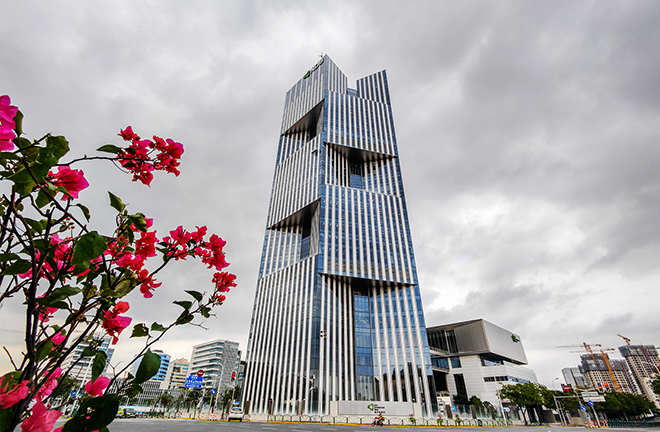
The headquarters building of the New Development Bank (NDB) in Shanghai Photo: CFP
Chinese President Xi Jinping hosted the 14th BRICS Summit via video link in Beijing, on June 23, 2022. The 14th BRICS Summit issued the XIV BRICS Summit Beijing Declaration. The BRICS strategic partnership has been further deepened and new contributions have been made to promote global development. Jaya Josie, former head of BRICS Research Center, Human Sciences Research Council in South Africa, and a visiting professor at the International Business School of Zhejiang University, said in an interview with CSST that BRICS countries respect the diversity of civilizations and will jointly build a new future for development.
CSST: What role has BRICS played in facilitating global governance?
Josie: President Xi Jinping made four important points in his speech titled “Fostering High-quality Partnership and Embarking on a New Journey of BRICS Cooperation,” which demonstrated that BRICS countries are on the correct path. President Xi called on BRICS nations to uphold solidarity and safeguard world peace and tranquility, to uphold cooperation to boost development and jointly tackle risks and challenges, to uphold the pioneering spirit and innovation and unleash the potential and vitality of cooperation, and to uphold openness and inclusiveness and pool collective wisdom and strength. President Xi’s speech pointed the direction towards high-quality partnership and global governance. The pursuit of cooperation and solidarity among Brazil, Russia, India, China, and South Africa was born from a long history of mutual solidarity and support for each country’s struggle for freedom, liberation, social justice, and economic development, which culminated in the founding of BRICS.
Acknowledging differences among its members in terms of history, culture, political systems, economic structures, resource endowments and levels of development, members view differences as a demonstration of the diversity of the world’s civilizations. BRICS countries share a history of solidarity. In today’s world, beset by conflict and instability, BRICS countries recognize in this diversity the possibility for deeper cooperation, for mutual benefit, drawing on each country’s comparative advantages to collectively complement and build upon each other’s strengths.
The 6th BRICS Summit issued the Fortaleza Declaration, which highlighted that since its inception BRICS has been guided by the overarching objectives of peace, security, development, and cooperation. The declaration stressed a renewed vision, based on openness, inclusiveness, and mutually beneficial cooperation. Many of the BRICS leaders at the 14th BRICS Summit in China underscored BRICS strategic vision adopted at the BRICS Summit in Brazil.
CSST: What’s your interpretation of this mechanism’s financial achievements?
Josie: The establishment of the BRICS New Development Bank (NDB) by the BRICS group was, collectively, the most notable achievement, particularly for developing and emerging countries. The name “BRICS New Development Bank” perhaps provides a clue as to what distinguishes this BRICS initiative from the Bretton Woods system, and other international development finance institutions. The establishment of the NDB can provide a cooperative platform for the constructive participation of BRICS countries in global economic governance, improve the influence and voice of BRICS countries and other emerging market countries in international economic affairs, and promote development of the global economic governance system, guiding it in a fair and reasonable direction.
Unlike the current group of multilateral development banks, where voting rights, shareholding, and funding sources tend to be dominated by a developed country or entity, BRICS member states have ownership, equal voting rights, control of shareholding and funding sources for the NDB. The NDB is bound to contribute to global growth and development as a multilateral and regional financial institution.
The BRICS vision and strategy, endorsed by the heads of state in Fortaleza in the Fortaleza Declaration, presented policy objectives that will address not only current threats to peace and security, combating global insecurity and violence, but also domestic developmental challenges associated with unequal exchanges and unequal economic development, poverty, inequality, and social exclusion.
All BRICS member states have common ideals in the pursuit of economic and social development in their own countries. BRICS is committed to social justice and building an international political and economic order that is just and fair. Thus, the NDB and the BRICS Contingent Reserve Arrangement (CRA) are key BRICS instruments, which respectively mobilize resources for infrastructure and sustainable development projects, and cushion against external financial shocks that negatively impact BRICS and other developing and emerging economies.
CSST: How do we strengthen the cooperation mechanism among BRICS countries to foster high-quality partnership?
Josie: Currently BRICS is expanding the BRICS group to include other emerging markets and developing countries, further promoting “BRICS Plus” cooperation. Countries are confronting financial challenges that are reflected in infrastructure deficits and considerations such as exchange rate instability, inflation rates, and other concerns. For this reason, BRICS countries were required to ensure that the NDB and the CRA received broad support from each country’s legislation in the form of supportive laws. To date all BRICS countries have laws in place to support the NDB. Furthermore, the NDB is led, managed, and staffed by representatives from all BRICS countries. Currently, all BRICS countries are piloting financial mechanisms to overcome exchange rate volatility, inflation, and monetary policy constraints. Research in BRICS countries has found that all BRICS countries are considering the introduction of a Central Bank Digital Currency (CBDC) and the use of their own currencies for transactions among BRICS countries. Such a move will most certainly strengthen cooperative mechanisms among BRICS countries and extend solidarity and support to other emerging and developing countries.
Edited by ZHAO YUAN

